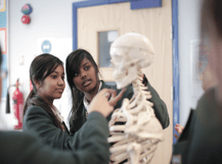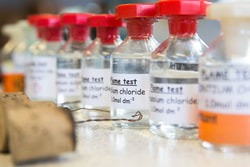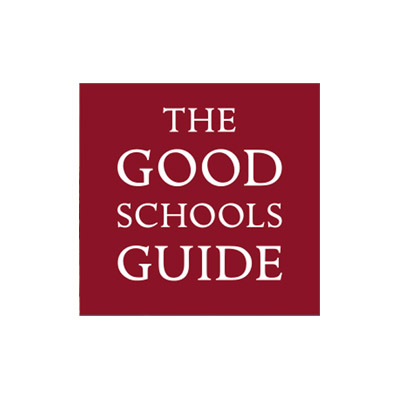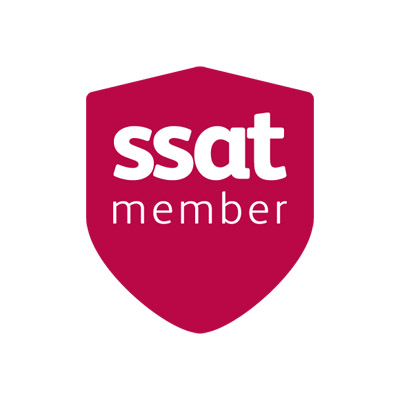Science
The intent of our curriculum is to provide girls with a high quality, broad and balanced Science education taught by specialists wherever possible which will equip all students for life beyond the classroom.
The department also provides courses which allow students of all abilities to continue with their Science education at KS5 and beyond. Alongside the three traditional Sciences, we offer a wide variety of subjects including GCSEs in Electronics and Astronomy in order to challenge students of all abilities and areas of scientific interest. Our Extended Project and Applied Science courses encourage independent learning and are excellent preparation for further education. All subjects are taught in a rigorous manner in order to secure positive outcomes.

Key Stage 3 Science
What you will study:
In each year of study, students will undertake units that cover Biology, Chemistry and Physics. Alongside this, students will continue to develop their practical Science skills. Our aim is to enable and support your daughter to develop confidence, resilience and a passion Science whilst building a solid foundation of both skill and knowledge for success at GCSE.
About the Department
Acting joint Heads of Department: Mrs Gowan and Ms Capaldi
Teaching staff: Miss Guest, Mrs Baird, Mrs Hue, Ms Wheeler, Dr Zacharopoulou, Dr Chaudry, Mr Sit, Ms Simpson and Mr Chan.
Senior Science Technician: Mrs Dumitresco
Science Technician staff: Mrs Ryder

Course Content:
| Biology | Chemistry | Physics | |
|---|---|---|---|
| Year 7 | Cells Structure and function of body systems Reproduction |
Particles and their behaviour Elements, atoms and compounds Reactions Acids and alkalis |
Forces Sound Light Space |
| Year 8 | Health and lifestyle Ecosystem processes Adaptation and inheritance |
The Periodic Table Separation techniques Metals and acids The Earth |
Electricity and magnetism Energy Motion and pressure |
Assessment:
Students are assessed at the end of topics, and are given SMART targets to ensure they can continue to develop and progress, in preparation for their GCSEs.
Key Stage 4 Science
Exam Board:
Edexcel GCSE (9-1)
Pathways:
GCSE Combined Science or GCSE Biology, GCSE Chemistry & GCSE Physics
The published specifications for the GCSE Science studies allow for all of our students to begin their GCSE studies in Year 9. At the start of year 10, students will continue to follow either the Edexcel GCSE Combined Science route, or the Edexcel individual Science GCSE route and complete all three Science subjects.

| Combined Science Pathway | Individual Science Pathway | |
|---|---|---|
| Number of GCSEs | 2 | 3 |
| Internal Assessment | End of topic tests End of year exam in years 9 and 10 Mock GCSE exams in year 11 |
|
| External Assessment | 2 x 1 hour 10 minute terminal exams for each of the Biology, Chemistry and Physics content covered |
2 x 1 hour 45 minute terminal exams for each subject |
Course Content:
GCSE Biology / Combined Science
Paper 1
Key concepts in Biology
Cells and Control
Genetics
Natural Selection and Genetic Modification
Health, Disease and the Development of Medicines
Paper 2
Key concepts in Biology
Plant Structures and their Functions
Animal Coordination, Control and Homeostasis
Exchange and Transport in Animals
Ecosystems and Material Cycles.
GCSE Chemistry / Combined Science
Paper 1
Key concepts in Chemistry
Atomic Structure
The Periodic Table
Ionic Bonding
Covalent Bonding
Types of Substances
Calculations Involving Masses
Electrolytic Processes
Obtaining and Using Metals
Reversible Reactions and Equilibria
States of Matter
Methods of Separating and Purifying Substances
Acids and Alkalis
Paper 2
Key concepts in Chemistry
Atomic Structure
The Periodic Table
Ionic Bonding
Covalent Bonding
Types of Substances
Calculations Involving Masses
Groups in the Periodic Table
Rates of Reaction
Heat Energy Changes in Chemical Reactions
Fuels
Earth and Atmospheric Science
Additional GCSE Chemistry content
Paper 1
Transition Metals, Alloys and Corrosion
Quantitative Analysis
Dynamic Equilibria, Calculations Involving Volumes of Gases
Chemical Cells and Fuel Cells
Paper 2
Hydrocarbons
Alcohols and Carboxylic Acids
Polymers
Qualitative Analysis
Bulk and Surface Properties of Matter
GCSE Physics / Combined Science
Paper 1
Motion
Forces and Motion
Conservation of Energy
Waves
Light and the Electromagnetic Spectrum
Radioactivity
Paper 2
Energy
Forces and their Effects
Electricity and Circuits
Magnetism and the Motor Effect
Electromagnetic Induction
Particle Model
Forces and Matter
Additional GCSE Physics content
Paper 1
Ultrasound
Ears and Hearing
Infrasound
Colour
Lenses
Infrared radiation
Nuclear fission and fusion
Astronomy
Paper 2
Rotational forces
Static electricity
Infrasound
Electromagnetic induction
Gas pressure and Volume
Pressure in liquids
Key Stage 5 Science
Applied Science:
Exam board
Type of qualification received
Current Entry Requirements
Grade 4 in GCSE Maths and Combined Science
Internal Assessment
2 Coursework Units
External Assessment
3 x 40 minute exams in Year 12
1 x 90 minute exam in Year 13 based on an assessed practical
Course Content
Unit 1: Principles and Applications of Science: includes Biology, Chemistry and Physics content.
Unit 2: Practical Scientific Procedures and Techniques. A coursework unit based on 5 core practicals.
Unit 3: Science Investigation Skills.
Unit 8: Physiology of Human Body Systems. A coursework Unit about the human body and the treatments for different disorders.
Previous successes
Students have gone on to study at Russell Group universities, many fulfilling their dreams of going into Nursing or Midwifery.
Biology:
Exam Board
Type of Qualification Received
Current Entry Requirements
GCSE grade 6 or above in Biology and one other Science if you have studied Triple Science
GCSE grade 6:6 if you have studied GCSE Combined Science
GCSE grade 5 or above in Mathematics and English Language
Internal Assessment
Investigative skills as well as the knowledge and understanding of core experiments will be tested in the A level exams. Teacher assessment of students’ skills, techniques and competency when completing practical work will count towards the Practical Endorsement Certificate at A level.
The Practical Endorsement is separate to the A level grade and, if awarded, is reported as a ‘Pass’ on A level certificates.
External Assessment
Paper 1 – Advanced biochemistry, microbiology and genetics
90 marks, 30% weighting, 1 hour 45 minutes Topics 1 – 7
Paper 2 – Advanced physiology, evolution and ecology
90 marks, 30% weighting, 1 hour 45 minutes Topics 1 – 4 and 8 -10
Paper 3 – General and practical principles in biology
120 marks, 40% weighting, 2 hours 30 minutes Topics 1 -10
Course Content
Students during the course of two years will complete the following topics:
1. Biological molecules
2. Cells, viruses and plant and animal reproduction
3. Classification and biodiversity
4. Exchange and transport
5. Photosynthesis and respiration
6. Microbiology and pathogens
7. Modern genetics
8. Origins of genetic variation
9. Control systems (kidneys, skin and homeostasis)
10. Ecology, conservation and man’s effect on the environment.
Students taking A level biology have taken a wide range of subjects at university including, nursing medicine, dentistry, neuroscience, biomedical science, pharmacy, environmental science and criminology.
Previous successes
Students taking A level Biology have taken a wide range of subjects at university including medicine, dentistry, neuroscience, nursing, biomedical science, pharmacy, environmental science and criminology.
Chemistry:
Exam Board
Type of Qualification Received
Current Entry Requirements
GCSE grade 6 or above in Chemistry and one other Science if you have studied Triple Science
GCSE grade 6:6 if you have studied GCSE Combined Science
GCSE grade 5 or above in Mathematics and English Language
Internal Assessment
Assessments at the end of each unit
Weekly homework
Assessment of practical skills during practical work
Mock exams in Y12 and Y13
Students are expected to carry out the sixteen core practical experiments that are identified in the topics.
The Practical Endorsement is separate to the A level grade and, if awarded, will be reported as a ‘Pass’ on A level certificates for students who achieve it.
External Assessment
Edexcel Level 3 Advanced GCE in Chemistry consists of three externally examined papers. The third paper will include synoptic questions that may draw on two or more different topics and questions on conceptual and theoretical understanding of experimental methods.
Paper 1 – Advanced Inorganic and Physical Chemistry
Topics 1-5, Topic 8, Topics 10-15
90 marks, 1h and 45 min, 30%
Paper 2 – Advanced Organic and Physical Chemistry
Topics 2-3, Topics 5-7, Topic 9, Topics 16-19
90 marks, 1h and 45 min, 30%
Paper 3 – General and Practical Principles in Chemistry
Topics 1-19
120 marks, 2h and 30 min, 40%
Course Content
Students will be expected to demonstrate and apply the knowledge, understanding
and skills described in the following content:
1. Atomic Structure and the Periodic Table
2. Bonding and Structure
3. Redox I and II
4. Inorganic Chemistry and the Periodic Table
5. Formulae, Equations and Amounts of Substance
6. Organic Chemistry I, II and III
7. Modern Analytical Techniques
8. Energetics I and II
9. Kinetics I and II
10. Equilibrium I and II
11. Acid Base Equilibria
12. Transition Metals
13. Modern Analytical Techniques II.
Students taking A level Chemistry have gone on to follow different routes. Last year our students went on to do Medicine, Biomedical Engineering, Accounting and Finance, Natural Sciences and Optometry.
Previous successes
Students taking A level Chemistry have gone on to follow different routes. Last year our students went on to do Medicine, Biomedical Engineering, Accounting and Finance, Natural Sciences and Optometry.
Physics:
Exam Board
Type of Qualification Received
Current Entry Requirements
GCSE Grade 6 or above in Physics and one other science (GCSE Biology or GCSE Chemistry) or Grade 6-6 or above in GCSE Combined Science. GCSE Grade 5 or above in Mathematics (higher paper) is essential.
GCSE Grade 6 or above in Mathematics is highly recommended.
Internal Assessment
Assessments at the end of each unit
Weekly homework
Assessment of practical skills during practical work
Mock exams in Y12 and Y13
External Assessment
The A level course is assessed by linear examinations. A Level students are examined on all six modules at the end of Year 13, two papers of 37% each and a synoptic paper of 26% of the total marks. 40% of the question paper assessment covers mathematical skills. In addition, A Level students will be awarded the practical endorsement certificate after successfully completing practical work set during the two year course.
Written papers:
Modelling Physics – 100 marks – 2 hours 15 mins (37%)
Exploring Physics – 100 marks – 2 hours 15 mins (37%)
Unified Physics – 70 marks – 1 hour 30 mins (26%)
Course Content
A Level Physics equips students with a wide range of academic and practical skills through the study of 6 modules:
1. Development of practical skills
2. Foundations of physics
3. Forces and motion
4. Electrons, waves and photons
5. Newtonian world and astrophysics
6. Particles and medical physics.
Previous Successes
Our Physics students have gone to university to study a variety of subjects: Physics, Astrophysics, Engineering, Computer Science, Medicine, Business.
Extension to Studies and Extracurricular Activities
There are many opportunities for students to develop their curiosity and passion for Science.
Year group/Key Stage
Name
Brief description
KS3
Science Club
Science Fair
Science Week
Faraday Challenge
Every 2 weeks. Lunch time. Practical based. Extension activities, thinking about application of science.
1 off timetable afternoon during British science week. Students make presentations in class and at home. There is a `market place ` event in which students can present their projects to others. In addition there are demonstrations in the science department by teachers and science based games, competitions and puzzles.
Year 11
Science Intervention
A weekly, 1 hour, targeted revision session designed to prepare students for the GCSE exams.
Years 9-11
Science Clinic
A weekly lunchtime drop-in session to help students with their Science work.
Y10
BPhO Physics Competition
Y11
BPhO Physics Challenge
Y12
BPhO AS Physics Challenge
Y13
British Physics Olympiad Competition
Extra curricular GCSEs
GCSE Astronomy
GCSE Electronics
Open to all students from Year 8 upwards. This run after school. Contact Mrs Gowan for details.
Open to all students from Year 9 upwards. This run after school. Contact Mrs Gowan for details and see information on the Curriculum / Non-Core Subjects section of the Holy Cross School website.
KS4/5
ORBYTS
In collaboration with another local school students are given the opportunity to participate in original astrophysics research. This is lead by a PhD student from UCL. At the end of the project students present their work at a conference in UCL.
KS3
Aeronautics Masterclass
Open to all students from Year 7 upwards. This run after school during the summer term. Contact Mrs Gowan for details.







